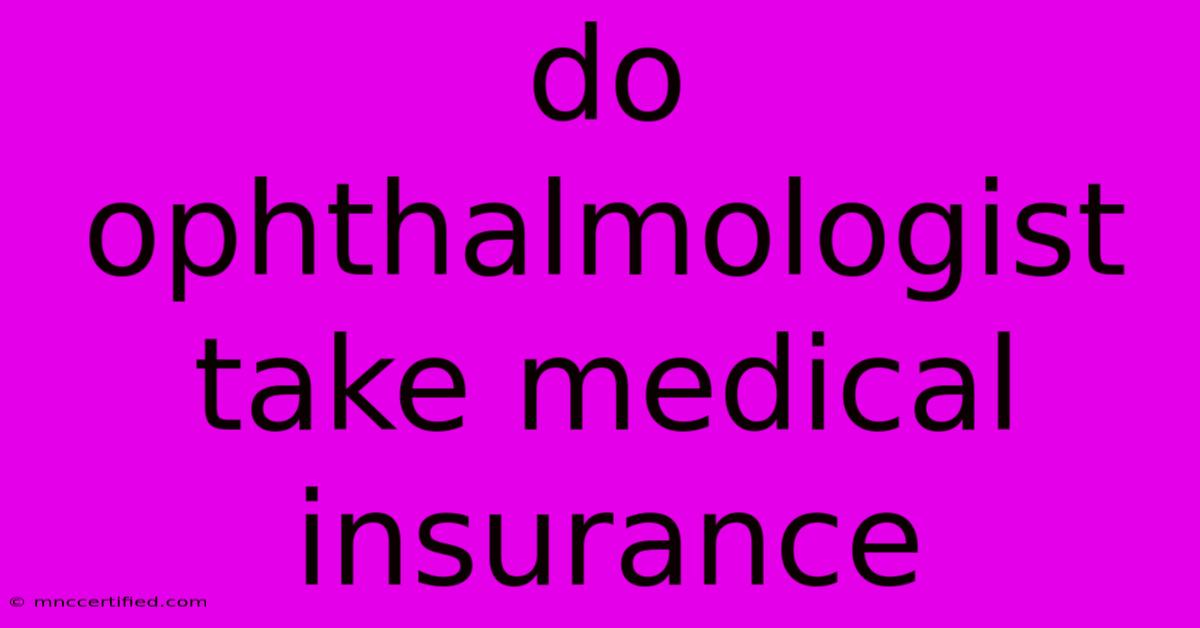Do Ophthalmologist Take Medical Insurance

Table of Contents
Do Ophthalmologists Take Medical Insurance? A Comprehensive Guide
When it comes to your eye health, choosing the right ophthalmologist is crucial. But with so many factors to consider, one question often pops up: do ophthalmologists accept medical insurance? The answer, thankfully, is usually yes. However, there are nuances to understand.
Understanding Ophthalmologists and Medical Insurance
Ophthalmologists are medical doctors specializing in eye care. They diagnose and treat various eye conditions, from common refractive errors to complex diseases like glaucoma and macular degeneration.
Most ophthalmologists accept a wide range of medical insurance plans. This means you can use your insurance benefits to cover the cost of your eye exams, treatments, and procedures. However, there are some important factors to consider:
Factors Affecting Coverage
- Insurance plan: Each insurance plan has its own coverage details, including co-pays, deductibles, and limitations on specific procedures. It's crucial to review your insurance policy to understand what's covered and what your out-of-pocket expenses might be.
- Network: Some insurance plans have preferred provider networks, meaning they offer lower co-pays and deductibles for providers within their network. Make sure the ophthalmologist you choose is in your insurance plan's network.
- Procedure: Not all procedures are covered equally. For example, routine eye exams may have a lower co-pay compared to procedures like cataract surgery. Check your plan for specific coverage details.
How to Find an Ophthalmologist Who Accepts Your Insurance
- Contact your insurance provider: Call your insurance company and ask about their network of ophthalmologists. They can provide you with a list of providers who accept your plan.
- Use online tools: Many insurance companies have online directories where you can search for providers in your area. You can usually filter by specialty (ophthalmology) and insurance plan.
- Ask your primary care physician: Your primary care physician may have recommendations for reputable ophthalmologists in your area.
What if Your Ophthalmologist Doesn't Accept Your Insurance?
If you find an ophthalmologist you like but they don't accept your insurance, don't worry. You can still see them, but you'll be responsible for paying the full cost out-of-pocket. However, you may be able to:
- Negotiate a discount: Some ophthalmologists may be willing to offer a discounted rate for self-pay patients.
- Explore alternative payment options: Ask about payment plans or financing options.
- Check with your insurance provider: Some insurance plans offer reimbursement for out-of-network providers, though the reimbursement amount may be lower than for in-network providers.
Tips for Maximizing Your Eye Care Coverage
- Get an annual eye exam: Most insurance plans cover at least one annual eye exam for adults. This is a crucial preventive measure that can detect early signs of eye disease.
- Understand your benefits: Take the time to review your insurance policy and understand what's covered.
- Ask questions: Don't hesitate to ask your ophthalmologist or your insurance provider about coverage details and any potential out-of-pocket expenses.
In conclusion, most ophthalmologists accept medical insurance, but it's essential to verify coverage and network details beforehand. By understanding your insurance plan and choosing an in-network provider, you can ensure affordable and convenient access to quality eye care.

Thank you for visiting our website wich cover about Do Ophthalmologist Take Medical Insurance. We hope the information provided has been useful to you. Feel free to contact us if you have any questions or need further assistance. See you next time and dont miss to bookmark.
Featured Posts
-
Testosterone Therapy Covered By Insurance
Nov 07, 2024
-
Insurance Estimate Higher Than Contractor
Nov 07, 2024
-
Ja Morant Injured Grizzlies Defeat Lakers
Nov 07, 2024
-
Shetland Alison O Donnell Reacts To Episode 1 Twist
Nov 07, 2024
-
Indiana Opens Season With 80 61 Win Over Siu Edwardsville
Nov 07, 2024